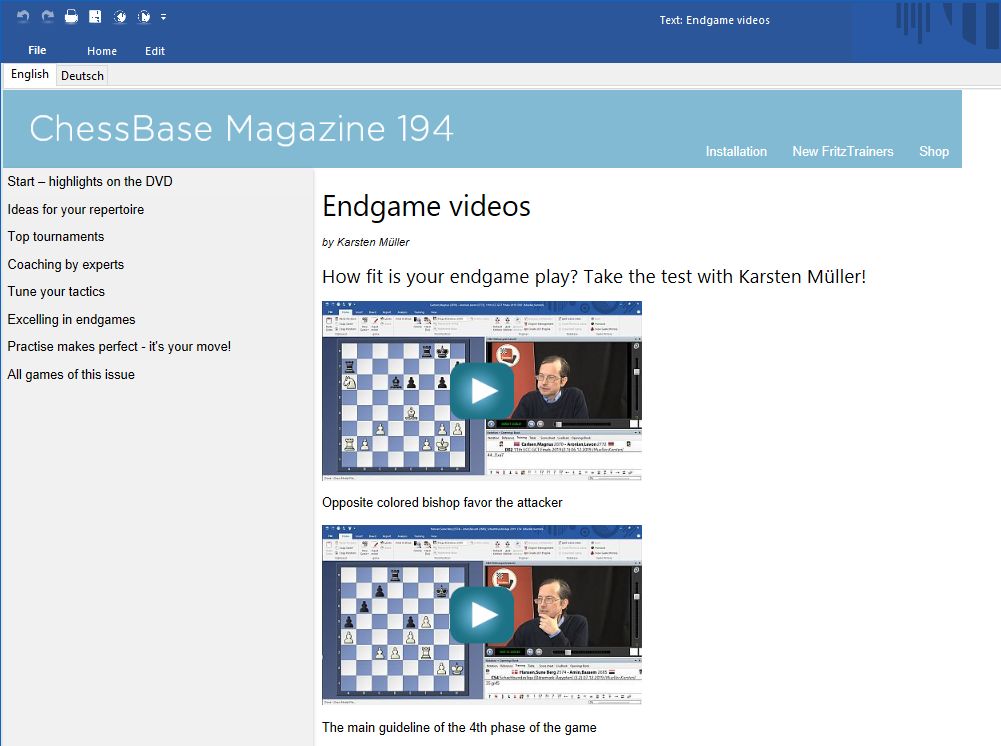Points forts de ce numéro
Le rusé 6.a3!?
Alexander Seyb s'intéresse à une nouvelle tentative de tacler la Najdorf
Bienvenue aux positions avec Pion Dame Isolé!
Robert Hungaski recommande 3.e3 e5! dans le Gambit Dame Accepté
Milieu de jeu sans pièces mineures
Mihail Marin détaille les stratégies efficaces dans les finales de pièces lourdes
Échanger les Dames à tout prix - 13.g4!? vs la Maroczy
David Navara dissèque sa trionphe dans sa finale contre Dmitry Jakovenko à Jérusalem
“Mes parties préférées de l'année 2019”
Revivez avec Simon Williams la partie Dubov-Svane dans le “Move by Move”!
Analyses de stars
Parties annotées par Giri, Firouzja, So, Duda, Navara, Van Foreest, Nielsen, Sarin, l’Ami et bien d'autres champions encore
Un vent nouveau dans la Variante d'Échange de la Caro-Kann
Roven Vogel recommande ...♝f5 comme antidote
Ma première nulle contre le Champion du Monde!!
Jan-Krzysztof Duda analyse une rencontre explosive à Wijk aan Zee
Duel néerlandais
Anish Giri revisite sa partie contre Jorden Van Foreest
Compensation à long terme
Les vrais sacrifices sont ceux qui ne mènent pas directement à la victoire. Vidéo interactive avec Oliver Reeh!
Un coup calme qui lance la traque du Roi adverse
Rainer Knaak presents another trap in the Philidor Defence (video)
Top tournament Tata Steel 2020 with lots of star analyses
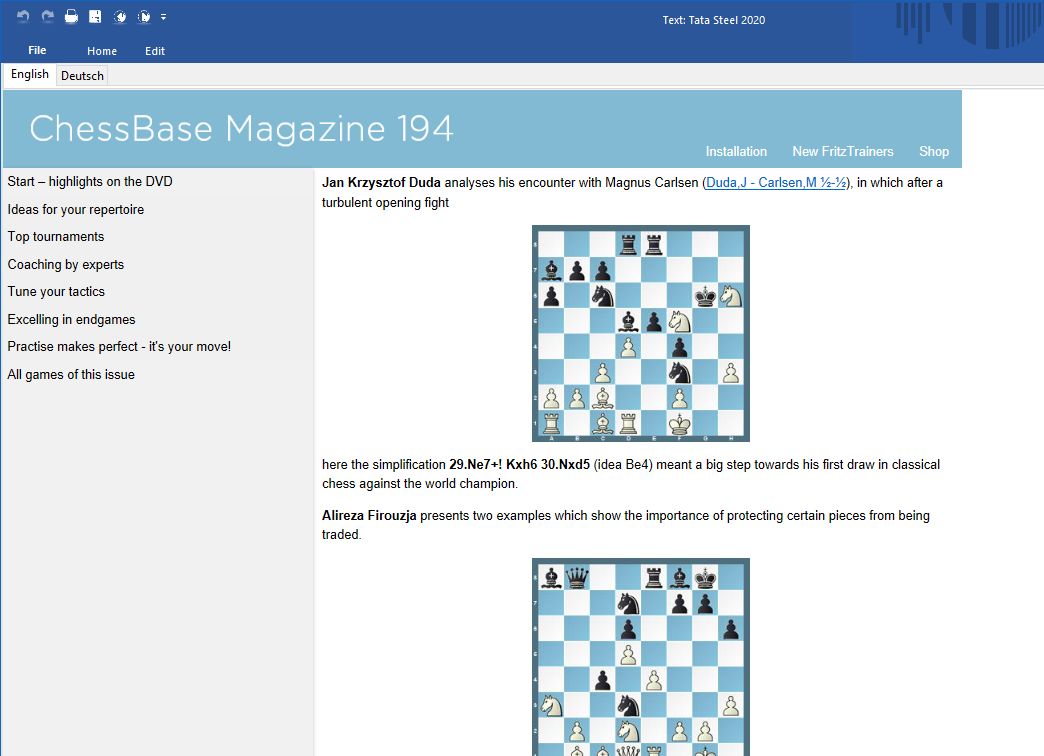
Jan-Krzysztof Duda, Alireza Firouzja, Wesley So, Anish Giri, Erwin l'Ami, Nihal Sarin, Peter Heine Nielsen, Roven Vogel, Surya Ganguly and many more analyse the best games from Wijk aan Zee. Moreover, GM Romain Edouard presents the highlights of the Grand Chess Tour Final in London 2019, and David Navara comments on his best game from the FIDE Grand Prix in Jerusalem which completed the 2019 series in December.
„Move by Move“!
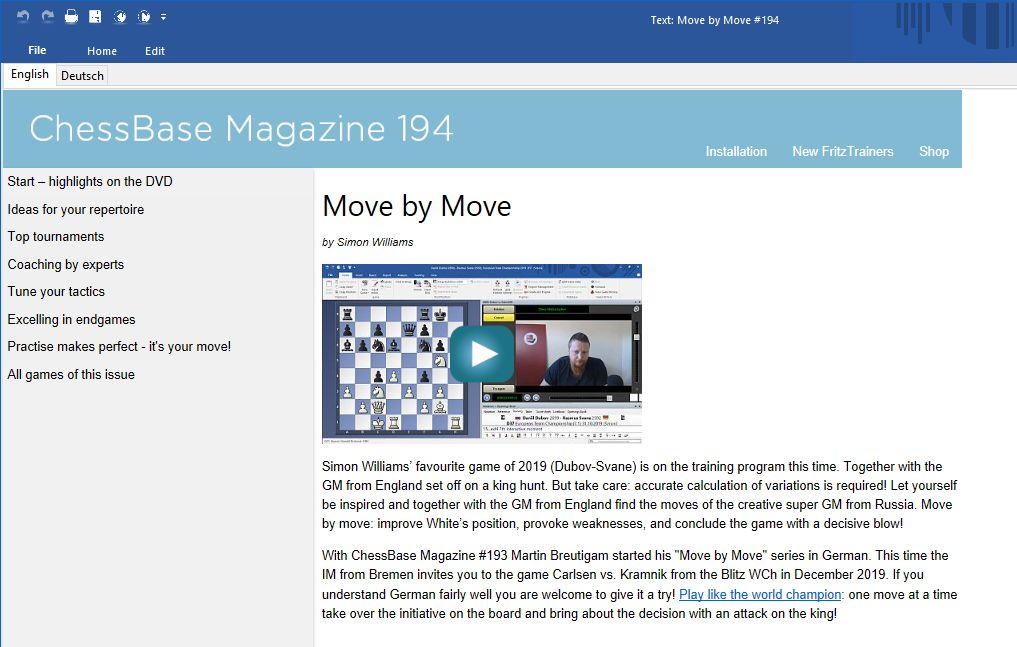
Simon Williams’ favourite game of 2019 (Dubov-Svane) is on the training program this time. Together with the GM from England set off on a king hunt. But take care: accurate calculation of variations is required! Let yourself be inspired and together with the GM from England find the moves of the creative super GM from Russia. Move by move: improve White’s position, provoke weaknesses, and conclude the game with a decisive blow!
New ideas for your repertoire
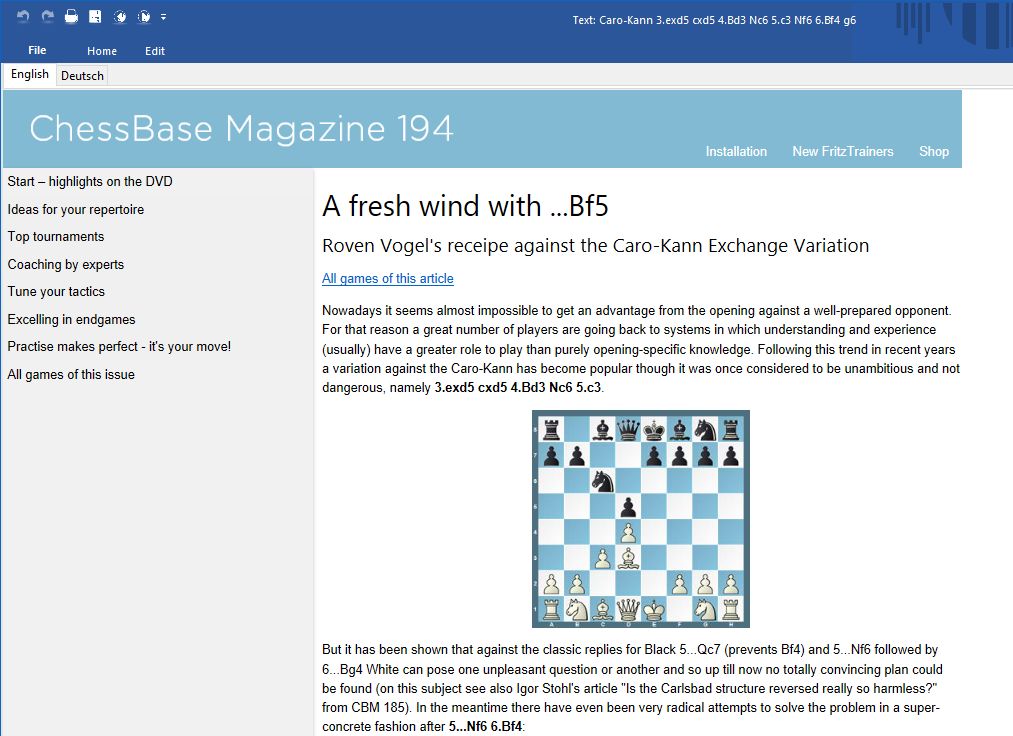
11 opening articles with new recommendations for your repertoire await you:
Romain Edouard: English 1.c4 e5 2.d3
Roven Vogel: Caro-Kann with 3.exd5 cxd5 4.Bd3 Nc6 5.c3
Petra Papp: Sicilian Najdorf with 6.Bd3 e6 7.f4
Alexander Seyb: Sicilian Najdorf with 6.a3
Viktor Moskalenko: French 3.Nd2 Nf6 4.e5 Nfd7 5.f4 with Black playing c5-c4
Renato Quintiliano: Two Knights Game 3.Bc4 Nf6 4.Ng5 d5
Robert Ris: Ruy Lpez 4.Ba4 Nf6 5.0-0 Bc5 6.c3 0-0 7.d4 Ba7
Krisztian Szabo: Ruy Lopez Anti-Marshall 8.a4 d5!?
Robert Hungaski: Queen’s Gambit Accepted 1.d4 d5 2.c4 dxc4 3.e3 e5
Evgeny Postny: Grünfeld Defence 3.g3 Bg7 4.Bg2 and 7.Ne2
Lars Schandorff: Queen’s Gambit Ragozin with 9.Tc1
Topical opening traps

Rainer Knaak presents eight traps from recent tournament practice (including three FritzTrainer videos). This time our trap expert found material, e.g. in the Caro-Kann, Philidor Defence, English Opening, and last but not least in the Sicilian!
Strategy – „Only queens and rooks!“
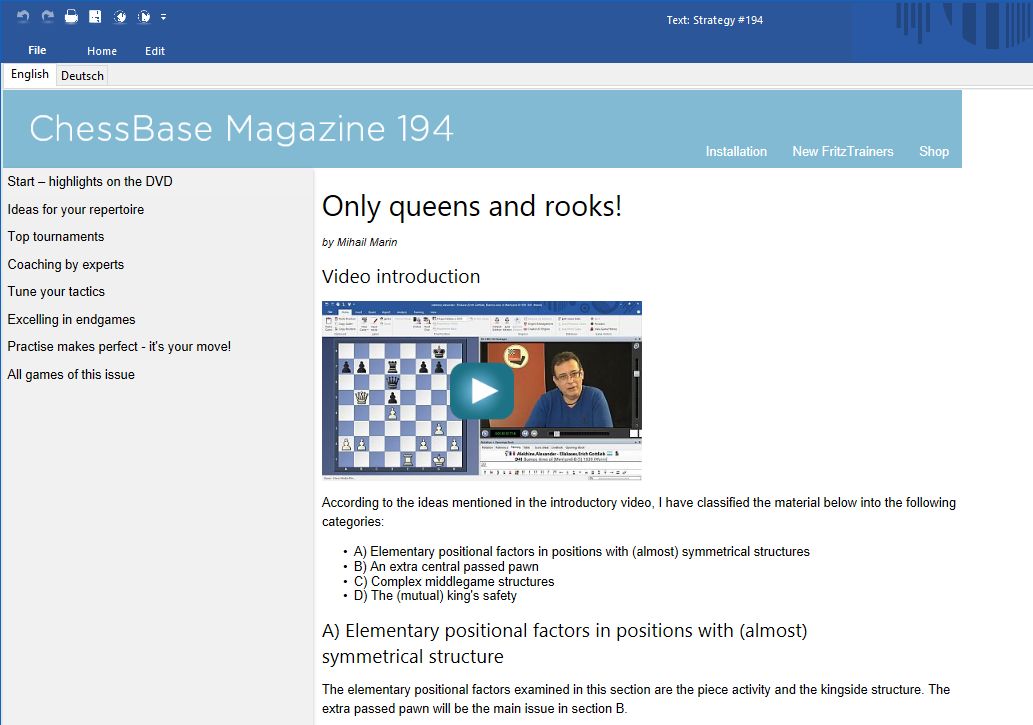
Whenever all the minor pieces have been exchanged, play takes on quite unique characteristics. What features are important for the evaluation of positions? What does the optimal position for the king look like? Mihail Marin shows you what is important!
Tactics – „Queens on the rampage“
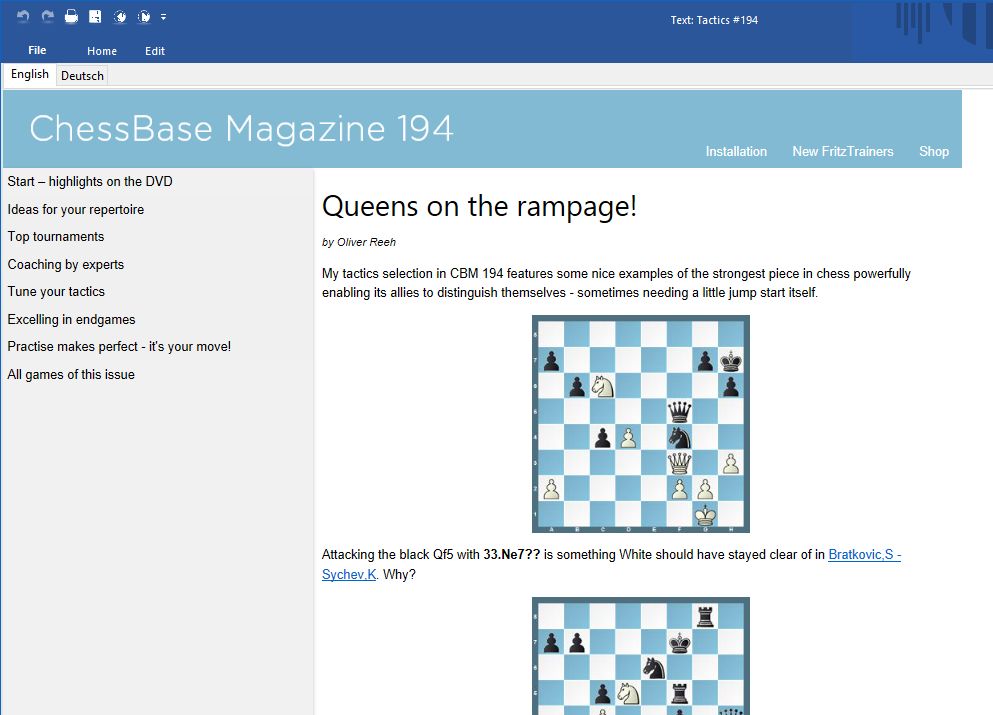
Oliver Reeh’s tactical selection contains 28 recent games, which are each studded with at least one training question. Moreover, the IM from Hamburg presents his three favourite combinations in interactive video format.
Opening videos
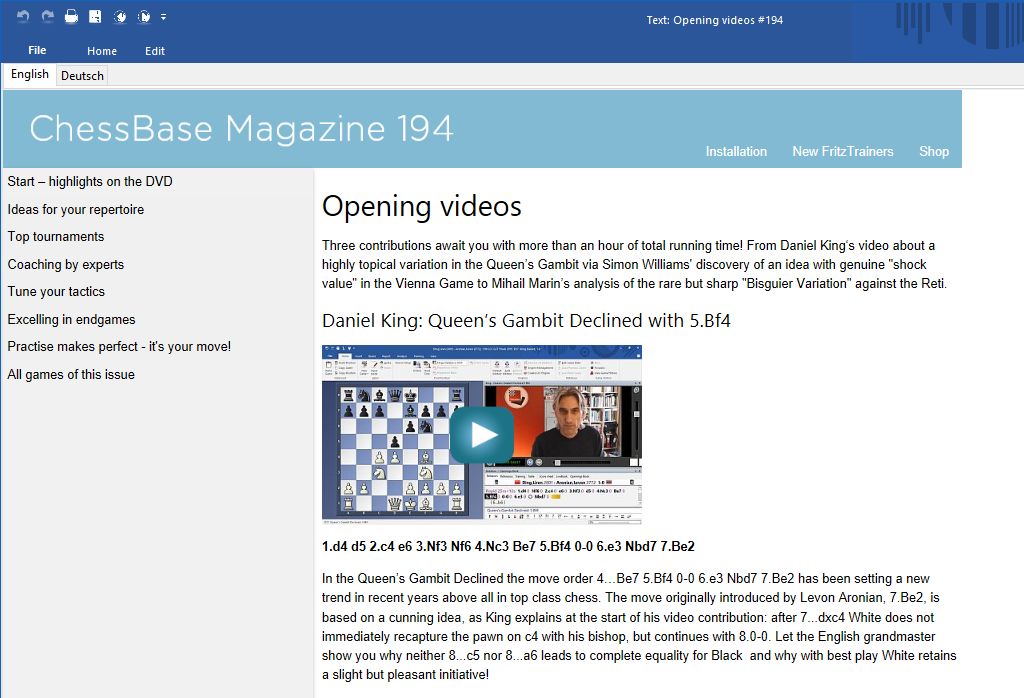
Three contributions await you with more than an hour of total running time! From Daniel King's video about a highly topical variation in the Queen’s Gambit via Simon Williams' discovery of an idea with genuine "shock value" in the Vienna Game to Mihail Marin’s analysis of the rare but sharp "Bisguier Variation" against the Reti.
Daniel King: Queen’s Gambit Declined
1.d4 d5 2.c4 e6 3.Nf3 Nf6 4.Nc3 Be7 5.Bf4 0-0 6.e3 Nbd7 7.Be2
Simon Williams: Vienna Game
1.e4 e5 2.Nc3 Nf6 3.f4 d5 4.fxe5 Nxe4 5.d3
Mihail Marin: Anti-Reti
1.Nf3 d5 2.d4 Nc6 3.g3 Bg4
„The Classic“
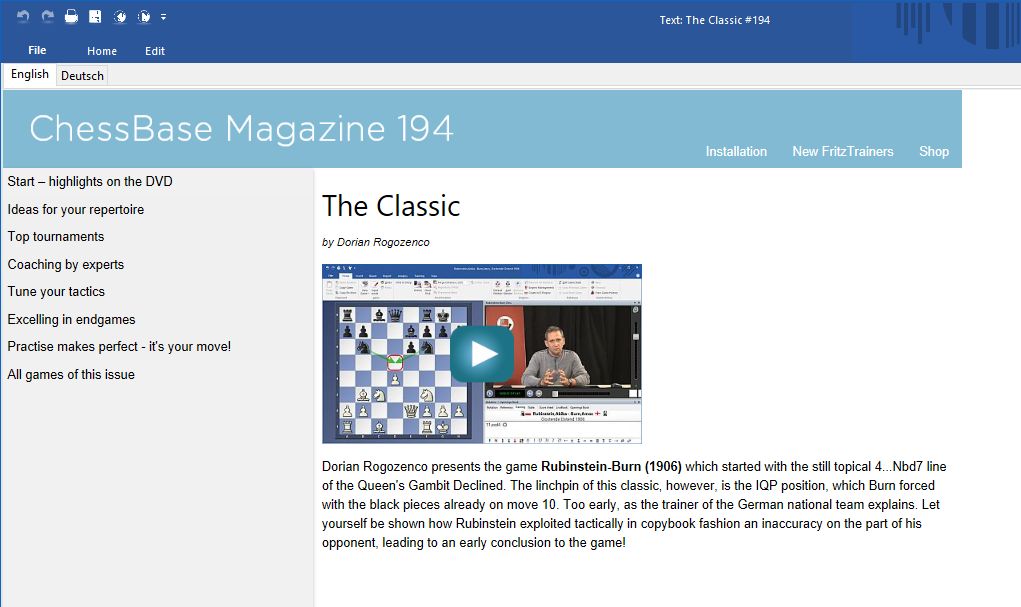
Dorian Rogozenco presents the game Rubinstein-Burn (1906) with a position involving an IQP on d4. Watch how Rubinstein tactically exploited his opponent's inaccuracy in textbook style, leading the game to an early conclusion!
Endgame – „Recent endings with bishops of the same colour“
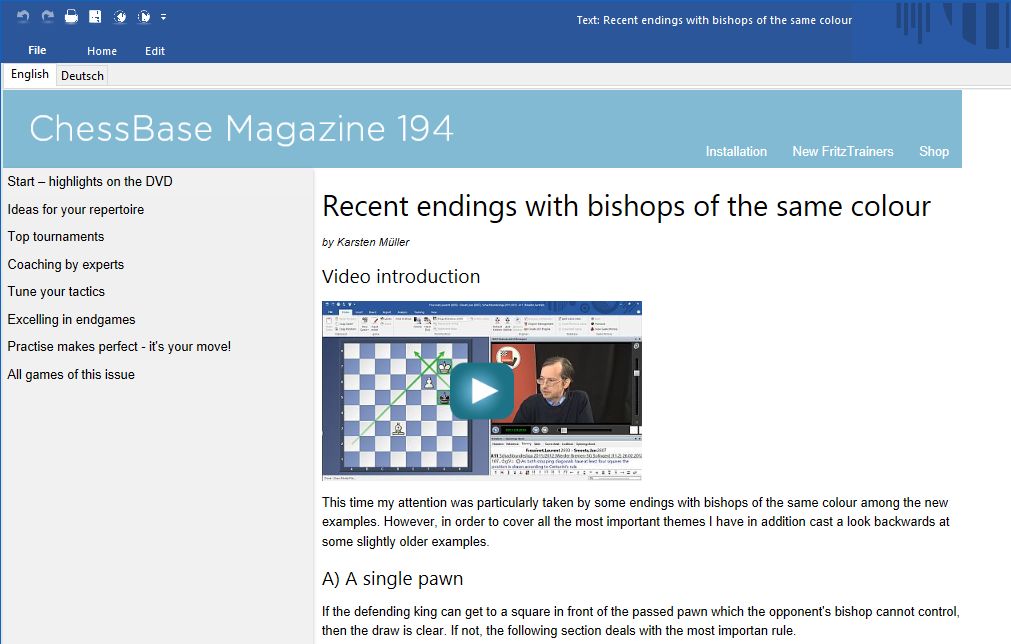
Karsten Müller explains another fundamental endgame topic by means of catchy terminology, such as "granite blocks of pawns", and rules of thumb like "Centurini’s rule". Plus endgame videos with a total running time of over an hour and an extra column: "Readers write".
